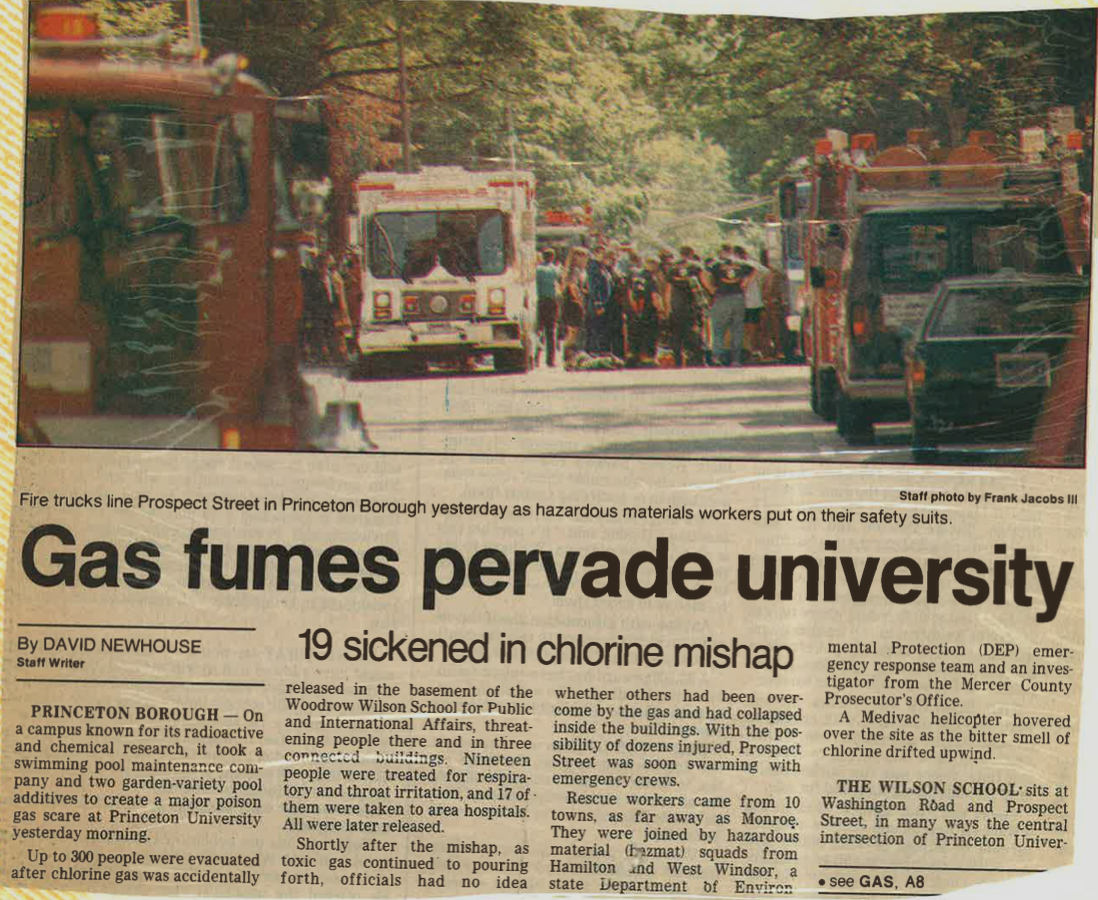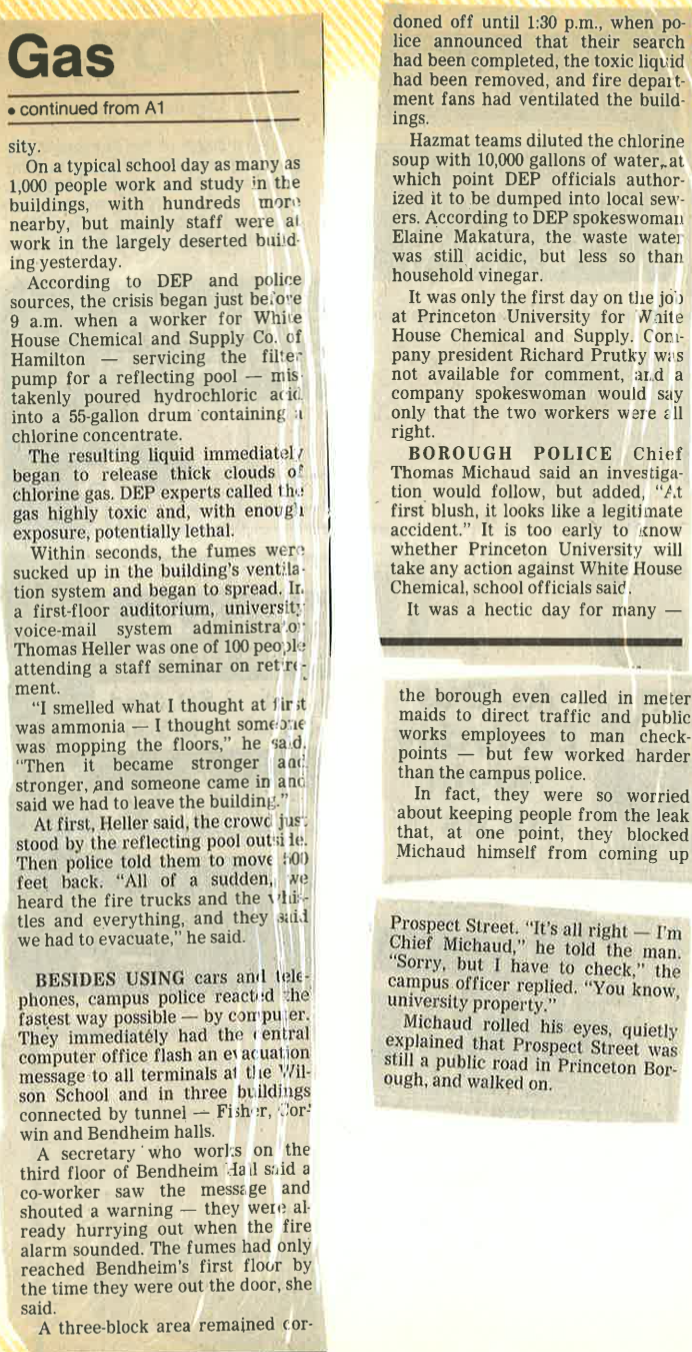
July 20, 1995
Gas fumes pervade university
19 sickened in chlorine mishap
By David Newhouse
Staff Writer
PRINCETON BOROUGH — On a campus known for its radioactive and chemical research, it took a swimming pool maintenance company and two garden-variety pool additives to create a major poison gas scare at Princeton University yesterday morning.
Up to 300 people were evacuated after chlorine gas was accidentally released in the basement of the Woodrow Wilson School for Public and International Affairs, threatening people there and in three connected buildings. Nineteen people were treated for respiratory and throat irritation, and 17 of them were taken to area hospitals. All were later released.
Shortly after the mishap, as toxic gas continued to pouring forth, officials had no idea whether others had been overcome by the gas and had collapsed inside the buildings. With the possibility of dozens injured, Prospect Street was soon swarming with emergency crews.
Rescue workers came from 10 towns, as far away as Monroe. They were joined by hazardous material (hazmat) squads from Hamilton And West Windsor, a state Department of Environmental Protection (DEP) emergency response team and an investigator from the Mercer County Prosecutor’s Office.
A Medivac helicopter hovered over the site as the bitter smell of chlorine drifted upwind.
THE WILSON SCHOOL sits at Washington Road and Prospect Street, in many ways the central intersection of Princeton Univer…

sity.
On a typical school day as many as 1,000 people work and study in the buildings, with hundreds more nearby, but mainly staff were at work in the largely deserted building yesterday.
According to DEP and police sources, the crisis began just before 9 a.m. when a worker for White House Chemical and Supply Co. of Hamilton – servicing the filter pump for a reflecting pool – mistakenly poured hydrochloric acid into a 55-gallon drum containing a chlorine concentrate.
The resulting liquid immediately began to release thick clouds of chlorine gas. DEP experts called the gas highly toxic and, with enough exposure, potentially lethal.
Within seconds, the fumes were sucked up in the buildings ventilation system and began to spread. In a first-floor auditorium, university voice-mail system administrator Thomas Heller was one of 100 people attending a staff seminar on retirement.
“I smelled what I thought at first was ammonia – I thought someone was mopping the floors,” he said. “Then it became stronger and stronger, and someone came in and said we had to leave the building.”
At first, Heller said, the crowd just stood by the reflecting pool outside. Then police told them to move 500 feet back. “All of a sudden, we heard the fire trucks and the whistles and everything, and they said we had to evacuate,” he said.
BESIDES USING cars and telephones, campus police reacted the fastest way possible – by computer. They immediately had the central computer office flash an evacuation message to all terminals at the Wilson School and in three buildings connected by tunnel – Fisher, Corwin and Bendheim halls.
A secretary who works on the third floor of Bendheim Hall said a co-worker saw the message and shouted a warning – they were already hurrying out when the fire alarm sounded. The fumes had only reached Bendheim’s first floor by the time they were out the door, she said.
A three-block area remained cordoned off until 1:30 p.m., when police announced that their search had been completed, the toxic liquid had been removed, and the fire department fans had ventilated the buildings.
Hazmat teams diluted the chlorine soup with 10,000 gallons of water, at which point DEP officials authorized it to be dumped into local sewers. According to DEP spokeswoman Elain Makatura, the waste water was still acidic, but less so than household vinegar.
It was only the first day on the job at Princeton University for White House Chemical and Supply. Company president Richard Prutky was not available for comment, and a company spokeswoman would say only that the two workers were all right.
BOROUGH POLICE Chief Thomas Michaud said an investigation would follow, but added, “At first blush, it looks like a legitimate accident,” It is too early to know whether Princeton University will take any action against White House Chemical, school officials said.
It was a hectic day for many – the borough even called in meter maids to direct traffic and public works employees to man checkpoints — but few worked harder than the campus, police.
In fact, they were so worried about keeping people from the leak that, at one point, they blocked Michaud himself from coming up
Prospect Street. “It’s all right — I’m Chief Michaud,” he told the man. “Sorry, but I have to check,” the campus officer replied. “You know, university property.”
Michaud rolled his eyes, quietly explained that Prospect Street was still a public road in Princeton Borough, and walked on.